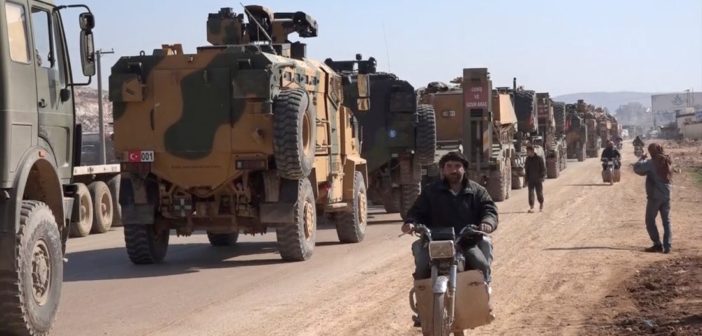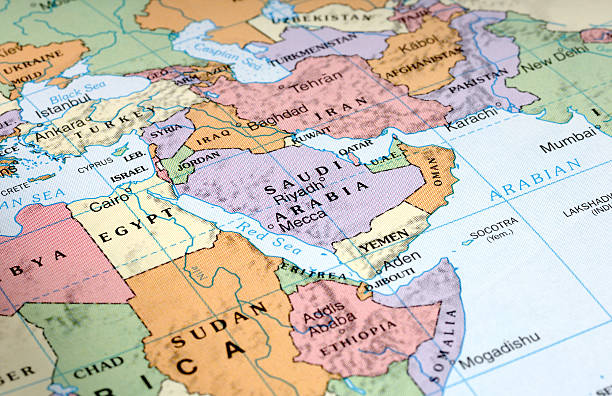
The agreement reached in May 2017 by Russia, Iran and Turkey in Astana called for the cessation of hostilities between rebel groups and regime forces in four “de-escalation” zones in the mainly opposition-held areas of Syria with Russia, Turkey and Iran acting as guarantors.
In broad terms, the deal covered four areas:
Zone 1: Idlib province,
Zone 2: The Rastan and Talbiseh enclave in northern Homs province,
Zone 3: Eastern Ghouta in the northern Damascus countryside,
Zone 4: The rebel-controlled south along the border with Jordan.
Between March and July 2018, Russia helped the Syrian regime recapture the last three de-escalation zones. Then, Damascus turned its attention to Idlib. In August, Russia threatened an “anti-terrorist operation” in the area. A month later, Presidents Erdoğan and Putin reached an understanding in Sochi to reinforce the Idlib de-escalation agreement by creating a partially demilitarized zone.
At the time I said:
“Idlib is a de-escalation area under an agreement brokered in Astana last year. Under that agreement, Turkish armed forces have set up military observation posts across the province which borders Turkey. Thus, an all-out attack on Idlib would not only put them in harm’s way but also trigger yet another mass exodus into Turkey which already hosts 3.5 million Syrian refugees. Thus, Ankara has been cautioning against such an assault. So, it would again be up to Moscow to orchestrate developments there because maintaining the status quo is not an option. Suffice to add that Moscow considers most of the opposition fighters in Idlib as terrorists…”
And, I asked the following questions:
“• Are Russia, Iran and the Assad regime determined to eliminate the militants no matter what?
“• If, in theory, the “militants” were to leave Idlib, where would they go?
“• What if they head towards Afrin, moving even closer to the Turkish border?
“• And above everything else, is there any hope of separating the ‘healthy opposition’ from the ‘terrorists’?”[i]
The situation in Idlib is continuing to prove an intractable challenge.
After more than four years since its intervention in Syria, Russia would like to deal the final blow to jihadist groups and move forward with the political process. Beyond regime’s survival, Moscow’s twin objectives seem to be re-opening direct talks between Ankara and Damascus and further weakening of Turkey’s relations with the West.
President Assad would like to declare victory over the Islamic State and other similar groups so that he can turn to northeast Syria to address the PYD/YPG question preferably from a position of strength.
But, a major assault against Idlib will confront Turkey with two major challenges: another wave of refugees and together with them a likely influx of “rebels/militants/terrorists”.
On Monday, February 3, Foreign Minister Sergey Lavrov had a telephone conversation with his Turkish counterpart Minister Çavuşoğlu upon the initiative of the Turkish side. The next day, answering questions from Rossiyskaya Gazeta, Mr. Lavrov said:
“Regrettably, so far, Turkey has failed to fulfil a couple of its key commitments that were designed to resolve the core of the Idlib problem. It was necessary to separate the armed opposition that cooperates with Turkey and is ready for a dialogue with the government in the political process, from the terrorists of Jabhat al-Nusra, which became Hayat Tahrir al-Sham. Both are blacklisted as terrorist groups by the UN Security Council, so neither Jabhat al-Nusra nor the latest version, Hayat Tahrir al-Sham, has anything to do in Idlib. The most we agreed on back in 2019 was that each party must observe the truce. But even after a third reminder by Russia and Turkey to those in the Idlib zone, the criminals I mentioned have not ceased their provocative actions…
“Another reason for this state of affairs is that the 10-20 km demilitarized strip has not been established inside the Idlib zone, something we reminded our Turkish partners of as well. We will push for complying with all the provisions of the decisions made by the presidents of Russia and Turkey. Reportedly, Turkish troops are being deployed in the Idlib zone, and there have been clashes between them and the Syrian army. Our military are monitoring this situation. According to our information, which has been made public by the General Staff, the Turkish military have advanced to certain locations inside the Idlib de-escalation zone without notifying us, and we were thus unable to notify the Syrian army about it either. Strikes were delivered, and Turkey is threatening retaliation. This is very sad. We urge them to strictly comply with the 2018 and 2019 Sochi accords on Idlib.
“The second issue arising from the risks and threats from the Idlib de-escalation zone is the fact that hundreds of militants, including al-Nusra and Hayat Tahrir al-Sham fighters, are moving from there to Libya in order to build up hostilities in that country. Again, based on the factors that I mentioned, Russia cannot overcome this challenge alone, but it can push for the unconditional and full implementation of the existing agreements on Idlib. We are discussing this with our Turkish partners.”[ii] (emphasis added)
In Turkey we hear tough talk all the time. But looking at what Russian leaders have said in recent years either on bilateral relations or the Turkish dimension of regional issues, this too is tough talk. Moreover, it is very precise.
On Tuesday, Vladimir Putin had a telephone conversation with President of Turkey Recep Tayyip Erdogan again at the Turkish side’s initiative. The statement from the Kremlin said, “It was pointed out that the Russian-Turkish agreements on Idlib, which provide for redoubling mutual efforts to neutralize the extremists, must be strictly complied with.”
Also on Tuesday, Secretary of State Pompeo issued a statement saying that the US condemns the continued, unjustifiable, and ruthless assaults on the people of Idlib by the Assad regime, Russia, Iran, and Hizballah; the February 3 mortar attack on Turkish observation posts by the Assad regime forces is a grave escalation and follows ongoing vicious attacks impacting civilians, humanitarian workers, and infrastructure; and, the US stands by its NATO ally Turkey.
And on Wednesday, Reuters reported that the US has halted a secretive military intelligence cooperation program with Turkey that for years helped Ankara target Kurdish PKK militants:
“The U.S. decision to indefinitely suspend the program, which has not been previously reported, was made in response to Turkey’s cross-border military incursion into Syria in October, the U.S. officials said, revealing the extent of the damage to ties between the NATO allies from the incident.”
Once it became part of the Syrian conflict Ankara has struggled to walk a fine line between Washington and Moscow. Now, with Turkish-American relations at their lowest point in decades on the one hand, and serious disagreements with Russia on Idlib on the other hand, this has become a tougher line to walk.
The questions I mentioned above, except the first one, are still on the table because there are no easy answers. But the answer to the first question seems to be “yes and without undue delay”.
Ankara was wrong to get involved in the Syrian conflict. Now, with four million Syrian refugees on our territory, we should not make our situation more problematic by fighting regime forces on Syrian territory and putting more Turkish troops in harm’s way.
Our seeing the light at the end of the tunnel depends on asking ourselves a simple question: “Why are we in Syria to begin with?”
————————————————————————————
[i] https://diplomaticopinion.com/2018/07/31/the-idlib-challenge/
https://diplomaticopinion.com/2018/09/09/the-idlib-challenge-and-the-tehran-summit/
https://diplomaticopinion.com/2018/09/18/the-idlib-challenge-and-the-sochi-summit/
[ii] https://www.mid.ru/en/foreign_policy/news/-/asset_publisher/cKNonkJE02Bw/content/id/4019314
Ali Tuygan, Ambassador (Ret’d) and former Undersecretary of the Turkish Foreign Ministry. The article is also published on his blog https://diplomaticopinion.com/2020/02/06/idlib-problem-reaching-boiling-point/#more-1454









